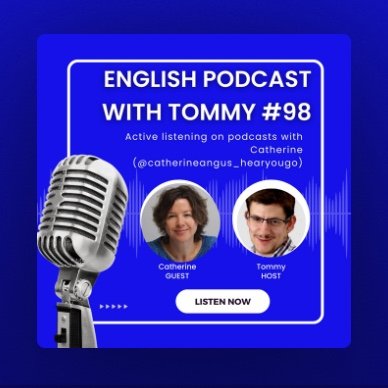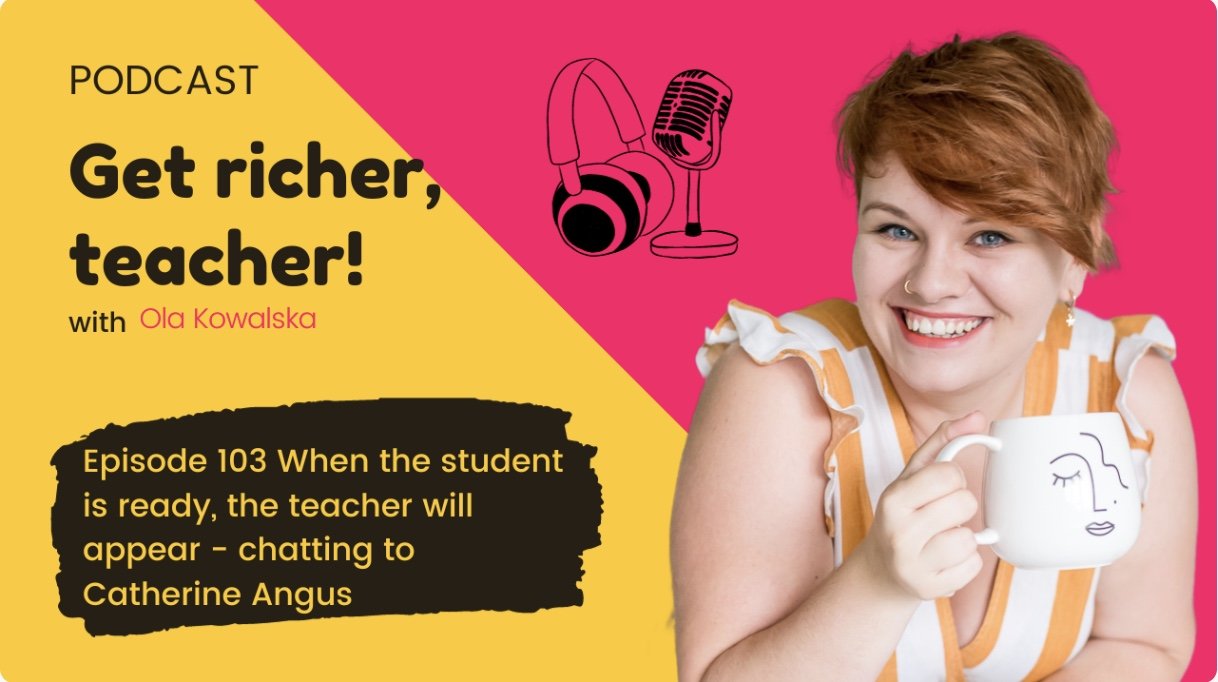Hear You Go podcast is available on all podcast platforms, and is hosted and accessible on Podbean.com.
Hear You Go
“First and foremost, I cannot express how deeply I am in love with your podcast. I generally looove a podcast as a format; I can say I am hooked on it. What do I like about yours? Well, everything. Your soothing voice - very pleasing to the ear, your ‘messy English’, topics you cover, to name but a few. And were I to describe you, using a couple of words, I would say that you radiate warmth and love. That would be my definition of you." — Dragana S., Serbia

Why do people like scary Movies? | English Listening
We’re gonna need a bigger boat! - Jaws
Here's Johnny! - The Shining.
Be afraid. Be very afraid. - The Fly.
Do you like watching horror movies?
I don't really like them, but I know that millions of people do, so I thought Halloween would be a good opportunity to look at the genre as you practice your English listening.
In today's episode, you'll learn about:
the English vocabulary we use when talking about horror movies (and the way they make us feel!)
the reasons why people like them and the reported benefits of watching these types of movies & TV shows, or reading horror books
the most popular and enduring horror movies of all time - be afraid!
Horror is a genre we see in movies, TV shows, video games, and books, and Halloween is often the occasion when fans rewatch their favourite scary movie, or perhaps dress up as their favourite character.
Are you a fan? Do you have a favourite scary movie?
I hope you enjoy the episode and that you learn a new thing or two.
For your listening practice, I challenge you to listen for the most common sound in English, the schwa /ə/. Make a list of words you hear that have this reduced sound. It's not easy, but I'm sure you can notice a couple, and maybe even a few.
If you'd like to dig deeper into the sounds of spoken English, work with me! Find out how here.

Episode 30 — When Giving Thanks is complicated.
Episode 30- When Giving Thanks Is Complicated.
Autumn in North America is a time when Canada and the USA celebrate Thanksgiving.
It's complicated.
On the one hand, it's important to celebrate the harvest, but on the other hand, there's a dark and cruel history to confront.
In today's episode, you'll hear about:
The history of Thanksgiving and how it's a little different between Canada and the US,
Why it's necessary to revisit this history in light of the lived experiences of the First Nations, and
The benefits of gratitude and giving thanks.
There are only a handful of countries in the world that officially celebrate a "Thanksgiving". I wonder why others don't.
Join me to learn a little more about this fall celebration and why it requires some reflection.
************************************
To learn more about the history of Canada's indigenous people, please explore the free online course offered by the University of Alberta. Click on this link to learn more.

Coffee: Drink Up Before it Disappears | English LIstening
Jackie Chan once said that "coffee is a language in itself". Hmm...
Do you speak coffee?
Well, if coffee is a language, what English words would you use to describe coffee?
For me, it's easy: hot, black and strong. No milk. No sugar. Unless it's a cappuccino, and then I want whole milk frothed to perfection, with a dash of cinnamon.
Ah coffee, I DO love you.
Every October 1st is International Coffee Day, and so in homage to this little bean that makes so many of us happy, let me offer this episode to you.
I know it helps you to speak English better because every advanced English teacher I follow on Instagram drinks lots of coffee :)
In today's English listening episode, you'll hear about:
the benefits of drinking coffee
the threat that the climate crisis poses for coffee and coffee growers, and
some recommendations to help make sure that all of us who love a cup of coffee can continue to enjoy it for many more years
Since coffee helps us learn English, lol, we really should make sure we safeguard this special bean.
Thanks for listening!

The How & Why of Noticing with Bistra | Intermediate English Conversations.
Episode 28: The How & Why of Noticing Language (in which Catherine is tested by Bistra).
What do you notice when you listen to a podcast or when you read a book? Do you actively notice language, and what do you do once you notice something?
In this episode, I talk with my friend and colleague, Bistra of English with Bistra, about the importance of noticing. We'll define some terms, then explain how people notice or can notice, and finally, what to do next so that you remember what it is that's caught your attention.
Plus, you'll hear Bistra quiz me a couple of times, and learn about why The Beatles were so important in Bistra's language development in English.
This episode will help both English language students and teachers learn how to notice better, and grow your English.
Be curious! You'll hear Bistra share this quote: "If you don’t want to learn, no one can make you, but if you want to learn, no one can stop you.” Don't let anything stop you!
You can find Bistra on Instagram:
https://www.instagram.com/english_with_bistra/
You can also learn about her courses on her webpage:
https://www.englishwithbistra.net/
To register for her webinar on noticing, on September 26th, click on the link.
*******************************************************
Did you hear the news?!
Hear WE Go podcast community on Patreon is open for registration. I really hope you'll join me in this new community for Hear You Go podcast listeners.
Please check out the membership benefits, and sign up by October 1st to be entered to win 6 months free membership.
The community is a space to communicate with me and other listeners, to access the transcript, in addition to more listening resources that will take your listening and learning further.
The membership includes a monthly Zoom meeting. Our next meeting is Saturday, October 7th at 9 a.m. EST (Toronto, Canada). Join us!
********************************************************
And as always, special thanks to Amos the Transparent for the theme music.




